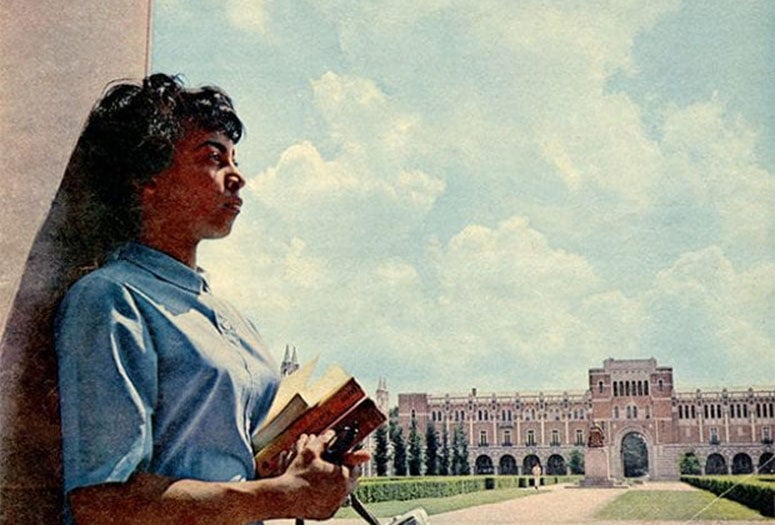As new students begin classes at Rice this fall, either virtually or in person, they face a year of uncertain beginnings, daunting challenges and unknown possibilities. Fifty-five years ago, Jacqueline Elizabeth “Jackie” McCauley arrived at Rice with some of those same feelings.
McCauley was the first Black woman admitted to Rice as an undergraduate and integrated the university's undergrad population with Charles Edward Freeman III in 1965. She died Aug. 9 in Canberra, Australia, at 73.
Embracing the activism of the '60s, McCauley chose Rice because she was determined the university should be held to its commitment to change. An academic star, she was the first Black student in Texas to be named a National Merit Scholar. McCauley was recruited by prestigious universities across the nation, but she chose Rice after reading a newspaper article describing how some alumni planned to prevent integration.
“Rice irritated me for doing that,” McCauley told Rice Magazine in 2016. “If I hadn’t gone to Rice, I would be aiding and abetting what I consider to be an immoral act. To walk away would be letting them get away with something that was no longer acceptable and had never been acceptable.”
Born in Fort Benning, Georgia, to Harriet and Willie McCauley, a retired Army veteran, Jackie McCauley lived all over the world before settling in Houston in 1963, later graduating from Kashmere Gardens High School.
The summer before starting classes at Rice, McCauley interned at NASA doing research work in the Apollo program. She intended to major in a science at Rice, but the social upheaval of the ’60s fascinated her and she switched her path to social sciences.
“This was the period when the country was going up in flames,” she told Rice Magazine. “It was ‘burn, baby, burn.’ When I made the move to sociology and psychology, I thought it was something meaningful.”
By the end of her first year at Rice, McCauley was married and helping with her husband’s work with Volunteers in Service to America (VISTA). McCauley’s grades suffered — partly because of her community involvement — and she was put on academic probation. She returned for her sophomore year, but dropped out after the fall semester.
“I was more of an activist, working with my husband with VISTA, which is like (a domestic) Peace Corps,” she said in 2016. “It wasn’t any failings of Rice that led me to leave. I was exploring other aspects of life. It didn’t fail me; it’s just that I moved on.”
In the 1970s, McCauley became program director of KLOL, a storied Houston rock music station on what was then the burgeoning FM radio band. She then moved to KSAN, a radio station in San Francisco, and then to Australia, where she hosted a radio show that was syndicated in 80 American cities. McCauley remained in Australia and operated a small business selling books to government offices and schools.
In the 2016 interview, McCauley acknowledged her impact on future generations of Black students at Rice.
“No one should be self-marginalized, which is what I would have been doing if I hadn’t applied,” she said. “You just do what you know is right in your heart. If what I did means that a number of other students could go to a university that previously had been unavailable to them, then sure, that is my legacy.”
McCauley is survived by her daughter, Elana, her brother, Vincent McCauley, and sister, Marganette McCauley Williams.

